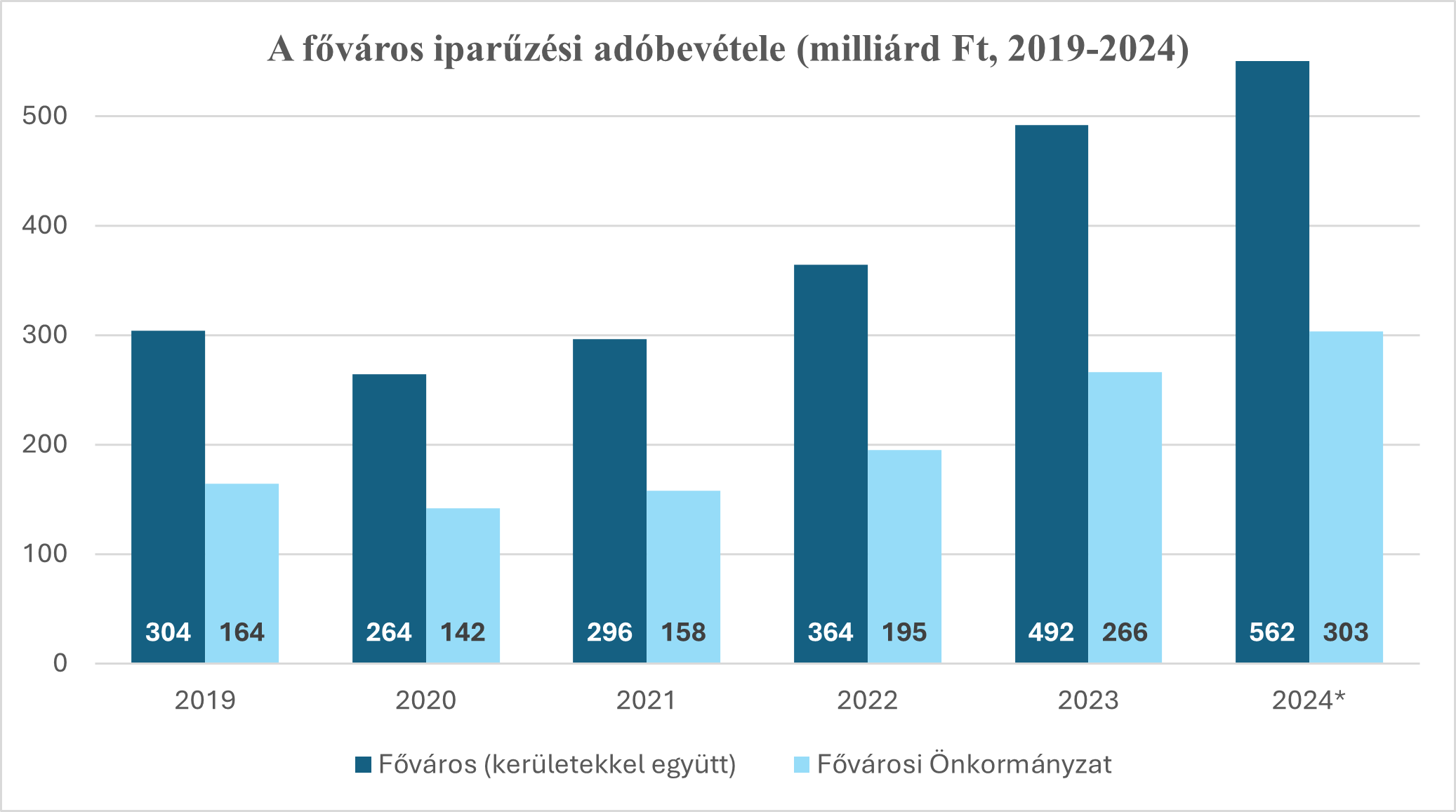Budapest’s main source of income, the business tax revenue, has increased by 85 percent (nearly doubled) during Gergely Karácsony’s term as mayor. During his time in office, Gergely Karácsony and the pro-Gyurcsány leaders he appointed have managed to raise nearly HUF 1 100 billion in business tax revenue, but according to their own admission, the capital is still on the verge of bankruptcy.
According to a financial survey conducted by the Nézőpont Institute, Budapest is a wealthy city in terms of income. The capital’s main source of income, the local business tax, is growing in a predictable and stable manner. According to the forecast, this revenue item alone could rise from HUF 304 billion in 2019 to HUF 562 billion in 2024, which means an increase of 85 percent over five years. No other Hungarian municipality has seen such an increase, only Budapest. According to the 2006 Act on the distribution of resources between the capital’s central budget and the district municipalities, the Municipality of the Capital is entitled to keep 54 percent of the total business tax revenue of the capital. Since Budapest can collect almost HUF 2,000 billion in business tax between 2020 and 2024, Gergely Karácsony’s administration will receive nearly HUF 1,100 billion in business tax revenue during his term as mayor.

While in 2019, the business tax revenue for the capital under István Tarlós was HUF 164 billion, in 2024, the city administration under Karácsony could reach HUF 303.5 billion. Although the final financial report for the capital’s 2023 budget has not yet been presented, the capital has published monthly reports on partial payments. According to these reports, Budapest’s business tax revenue was HUF 265.5 billion between January and December 2023, which means that it collected more than HUF 70 billion more tax than in the same period of 2022 (HUF 195 billion). According to expectations, in 2024, the local business tax revenue for the Municipality of Budapest will reach HUF 303.5 billion, which means that in the election year, Gergely Karácsony will have HUF 37 billion more local business tax revenue.
In order to reduce the regional disparities in local business tax revenues, rich municipalities have to pay a solidarity contribution. If Budapest’s local business tax revenue is reduced by the solidarity contribution, an amount of HUF 227 billion is expected to remain in 2024, compared to HUF 154 billion in 2019, which means an increase of 47.4 percent. If we look at the total budget of the Municipality of Budapest, we can see that it projected a total revenue of HUF 285[1] billion in 2019 and HUF 433[2] billion in 2024, which means an increase of 52 percent, exceeding the expected inflation rate for the whole period.
Since the capital under Gergely Karácsony did not take on any new public tasks in the last cycle, its expenditure should not have increased by more than the rate of inflation. However, the mayor and his colleagues have been talking about the capital’s near-bankruptcy situation and taking austerity measures for years. In 2023, Mayor Gergely Karácsony announced a HUF 25 billion “economic survival package”[3] in order to stretch Budapest’s budget at least until the end of the financial year. The package of measures was ineffective: his top deputy, Ambrus Kiss, already admitted in the first month of 2024 that they had started the new year with a deficit of nearly HUF 10 billion.[4]
Despite the failure, there were plenty of austerity measures. According to the monthly reports of revenues and expenditures of the Municipality of Budapest for the months I-XII of 2023[5], in 2023, operating expenditures were 10.7 percent below the planned target, while planned revenues were almost exactly met, meaning that even with revenue shortfalls and declining costs, they failed to balance the budget of the capital. This suggests that the capital’s financial difficulties are more likely to stem from financial irresponsibility rather than a lack of revenue.
It is noteworthy that Gergely Karácsony has given key positions in the management of the Municipality of Budapest to Ferenc Gyurcsány’s people. The chairmen of the board of directors of the Budapest Transport Centre Zrt. (BKK), the Budapest City Asset Management Zrt. and the BKM Budapest Public Utilities Nonprofit Zrt. all held important positions under the Gyurcsány government.[6] But other important leaders of the capital city – in the board of directors of the above mentioned companies, as well as of BKV or BVH Budapest City Management Holding – can also be linked to the Democratic Coalition. [7] It is worth mentioning that under the former prime minister, the Hungarian state, without negative external influences, had similarly bad management and an unprecedentedly high budget deficit.
—————————-
[1] Municipal Decree 8/2019 (III. 7.) of the General Assembly of Budapest on the 2019 consolidated budget of the Municipality of Budapest
[2] Municipal Decree 32/2023. (XII. 21.) of the General Assembly of Budapest on the 2024 consolidated budget of the Municipality of Budapest
[3] https://telex.hu/belfold/2023/04/19/budapest-karacsony-gergely-tuleloprogram-sajtotajekoztato
[4] https://magyarnemzet.hu/belfold/2024/01/meg-csak-januar-van-de-mar-kilenc-milliardos-minuszban-van-a-fovaros
[5] Financial Report, Months I-XII 2023
[6] Tibor Draskovics, Minister of Finance, Csaba Tordai, State Secretary of the Prime Minister’s Office, and Imre Mártha, CEO of the MVM Group.
[7] Gábor Nemes and Zoltán Gál J.
